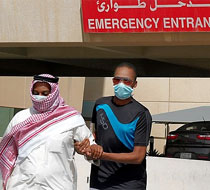 Jeddah, May 1: Two new deaths from the Middle East Respiratory Syndrome (MERS) coronavirus in Saudi Arabia has jacked up the toll to 107, the Ministry of Health said on Wednesday.
Jeddah, May 1: Two new deaths from the Middle East Respiratory Syndrome (MERS) coronavirus in Saudi Arabia has jacked up the toll to 107, the Ministry of Health said on Wednesday.
Sixteen new cases were also confirmed over the past 24 hours, raising the total number of cases diagnosed in the kingdom to 361, the MOH said in its webpage on MERS.
It said the two fatalities included a 41-year-old man in the northwestern city of Tabuk and an 88-year-old in Riyadh.
Of the 16 new infections, seven were reported in Riyadh, three in Jeddah, two in Tabuk, and one each in Makkah, Madinah, Najran and Hafr Al-Batin.
As in many other cases, most of the new infections involved persons more than 50 years old and suffering from other diseases such as chronic heart problems, hypertension and diabetes.
The figures in the Kingdom represent the bulk of infections registered worldwide.
According to the World Health Organization (WHO), apart from Saudi Arabia, cases have been reported in elsewhere in the Middle Eastern (Jordan, Kuwait, Oman, Qatar and United Arab Emirates); in Europe (France, Germany, Greece, Italy and the United Kingdom of Great Britain and Northern Ireland); in North Africa (Tunisia); and in Asia (Malaysia and the Philippines).
A WHO statement on Wednesday said the source and mode of infection for the virus remain undetermined.
“Approximately 75% of the recently reported cases are secondary cases, meaning that they are considered to have acquired the infection from another case through human-to-human transmission,” WHO Regional Director for the Eastern Mediterranean Dr. Ala Alwan said. “The majority of these secondary cases have been infected within the healthcare setting and are mainly healthcare workers, although several patients are also considered to have been infected with MERS-CoV while in hospital for other reasons.”
“Although the majority of the cases had either no or only minor symptoms, and most do not continue to spread the virus, WHO acknowledges that some critical information gaps remain to better understand the transmission of the virus as well as the route of infection. WHO is unaware at this point in time of the specific types of exposure in the health care facilities that have resulted in transmission of these infections, but this remains a concern,” it added.
WHO said it has offered its assistance to mobilize international expertise to work jointly with national health authorities in Saudi Arabia and the United Arab Emirates to investigate the current outbreaks in order to determine the transmission chain of this recent cluster and whether there is any evolving risk that may be associated with the current transmissibility pattern of the virus.





Comments
Add new comment